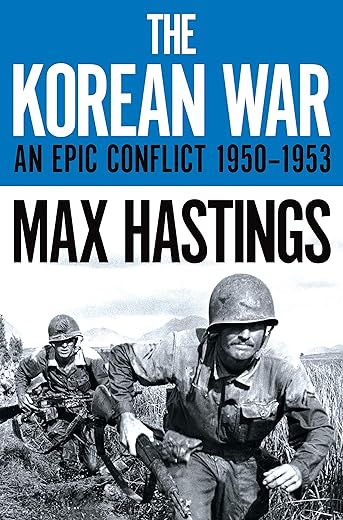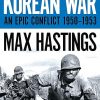The Korean War: An Epic Conflict 1950-1953
£12.30£16.10 (-24%)
The Korean War is journalist and military historian Sir Max Hastings’ compelling account of the forgotten war.
‘The best narrative history of the Korean conflict’ – Guardian
On 25 June 1950 the invasion of South Korea by the Communist North launched one of the bloodiest conflicts of the last century. The seemingly limitless power of the Chinese-backed North was thrown against the ferocious firepower of the UN-backed South in a war that can be seen today as the stark prelude to Vietnam.
Max Hastings draws on first-hand accounts of those who fought on both sides to produce this vivid and incisive reassessment of the Korean War, bringing the military and human dimensions into sharp focus. Critically acclaimed on publication, republished with an introduction from the author, The Korean War remains the best narrative history of this conflict.
‘A brilliant tour-de-force’ – Times Literary Supplement
‘Excellent, readable history by a master of the genre’ – Daily Mail
‘This book establishes him as one of the leading British military historians.’ – New York Times
Read more
Additional information
| Publisher | Main Market edition (1 Oct. 2020), Pan |
|---|---|
| Language | English |
| Paperback | 608 pages |
| ISBN-10 | 152903793X |
| ISBN-13 | 978-1529037937 |
| Reading age | 18 years and up |
| Dimensions | 13 x 4.2 x 19.7 cm |



by Malcolm Higgins
The war that is forgotten except by the participants. Close to nuclear war with China vs US. Little known country then but newsworthy now because of a megalomaniac in charge of the North.
Hastings does a fantastic job on the history and the ‘settlement’ at the 38th parallel. Very good read and very detailed. Read his Cuban crisis book and was enthralled by it so chose this one to follow it. We’ll done Max!!
by DAVID BRYSON
Korea is featuring quite prominently in the news these days, so I felt the need to remind myself of what little I had once known about the origins and early course of the Korean War. How authoritative an account of the matter I could expect this particular book to be, and how Max Hastings ranks among military historians, were things I didn’t know, but it seemed like a good place to start.
At least I give it high marks for readability, although the book is more than 500 pages long, and I felt that it petered out towards the end. The last date I recall mentioned in the text is 1960, when the corrupt and abusive Syngman Rhee was ousted as President of South Korea. As Hastings says, Rhee had rigged one election too many, but the story ends without saying where South Korea went from there, or who was in power in the Soviet Union. Historically, Korea had been tossed back and forth between China and Japan. WWII put a new countenance on the matter due simply to geography – this previously obscure small peninsula bordered on both China and the Soviet Union. America then decided (hastily it appears) to participate with these in a committee of Great Powers set up to decide its future. Korea had now taken on a new importance, because Great Power involvement means that there is a danger of loss of face when disagreements arise. In fact the Red Army halted its advance at the 38th parallel, so at least one trigger-point was avoided. However the rest of the story, as told by Max Hastings, depicts the subsequent conflict as, more than anything else, the War to Save Face.
When communist North Korea invaded the south in June 1950 it was very simply an act of naked aggression. Hastings focuses on who prompted the invasion – was it the brainchild of Kim Il-sung himself, or did China push him, or was it part of a great worldwide campaign for communism masterminded by the Soviet Union? More significant, to me at least, is the simple question Why? Why invade the south at all? It probably looked easy, I’d say. Syngman Rhee’s ramshackle armed forces were not going to put up much of a fight, and his rotten despotism probably commanded little loyalty. In the event the North Korean army swept all before it, and the American military advisers were not in much better shape. This time MacArthur pulled off perhaps his last masterstroke, with a surprise landing at Inchon, which can be roughly described as the port for Seoul. This isolated the forward divisions of the communist forces to the south and enabled MacArthur to head for the Yalu river, the border with China itself.
Kim Il-sung’s early triumph was a busted flush now, but China acted on the threats it had announced and sent in its own forces, with a humiliating consequent rout of the American troops. This was more than just face-saving, as must be obvious to all but the most doctrinaire supporter of the ‘West’. China had every reason to fear encirclement, but unhappily one of the said doctrinaire thinkers was no less than Douglas MacArthur, who probably went to his death convinced of an impending communist international master-plot organised from Moscow. The Korean War was threatening to get out of hand, particularly when some loose talk of using nuclear weapons was gaining currency. So Truman gripped the nettle and sacked MacArthur, the revered MacArthur, from his post as Supreme Commander of Far East forces.
The dramatic turnround in American performance and morale achieved by General Matthew Ridgway reads as just plain astonishing. However now the United Nations (aka USA) and the communist allies were fighting not for victory but for the wretched compromise of an armistice, with a border on the 38th parallel, i e exactly where the whole dismal issue had started off in the first place. Presumably they all saved at least some face. Would it have been better to have used nuclear weapons, regarded by some as merely a higher-powered explosive and not the crossroads of the universe that it really is?
Hastings doesn’t think so, nor do I, nor, I hope, do most of us these days. However if you are interested in a specially sinister sidelight on it all Hastings quotes a rant from John Foster Dulles at one point, and I recalled Churchill’s description of Dulles as a bull carrying around its own china-shop. I am naive enough to detect at least some minimal advance in strategic thinking when it comes to nukes, but I hardly need telling that I could be wrong about that.
The book is nicely written. The appalling conditions are described unflinchingly, or if the author has actually flinched at some other horrors I’m glad I don’t have to be told. Who had even heard of Korea in June 1950? Hastings suggests at one point that Kim Il-sung may have been mentally deranged. To say the least he has raised the profile of his small dictatorship, but raised it to what I can’t say at the moment. To the question Why did he launch his unprovoked invasion, it seems to me that the answer must have been that he was after easy glory, inflicting loss of face on America, and he nearly got away with it.
by John
The korean war is known as the forgotten war for a good reason. i wanted to learn about it and saw this as the best starting point. Max Hastings does an amazing job in covering the whole war from the first arrival of american troops after the surrender of Japan to the final ceasefire agreement in 1953. if your looking for an overview of the conflict then this is it. its covers in wonderful detail the the political and military side of it filled with veteran interviews of both UN and chinese forces. by far what makes its so great is the way the author is able to summarize and conclude so many parts in it that give you a great idea of the events. my own criticism is that its a very top down view of the war with little idea of what it was really like for the soldiers. while that is in a way good because it then focuses on the big events of the war which for someone who nothing of it is good yet there is little personal looks into what the soldiers experienced although there are many veteran accounts of their experience and battles. it includes a lot of great photos of the war and many haunting stories of many individuals who as the book says “were never heard from again”. with the situation today in Korea remaining much the same as it was when the cease fire was signed this is definitely a book to buy as it still today remains a current event and if the current situation is to be ever understood you have to start with this war and this book will give you a great start on a war that was very harsh with often heavy fighting yet is completely nude shadowed by the simple fact that it left many americans unsatisfied after the war as it was there first war in which they did not attain full victory but had to settle for a stalemate and ceasefire. fascinating from beginning to end.
by Teemacs
When this book was written Kim Il Sung was still the Great Leader of North Korea and South Korea was still in the hands of dictators. Still, this isn’t so important, except that it misses out on the remarkable progress made by South Korea in both the economic and political sphere and the acquisition of nuclear weapons by the hermit state that is the North. The war remains unfinished business, with the two countries still technically at war.
The history of the war is well presented, very readable for a book of this length. One can see that the lessons weren’t learned and this in turn led to many of the same mistakes being made in Vietnam. It was the first and last time the United Nations went to war. My one problem is that Sir Max seems to be somewhat Anglocentric in his views – I think he tries not to be, but every now and then, creeping round the edges, there is an undercurrent that the Commonwealth troops were all much more splendid chaps that the Americans. But then it was a majority American show with American commanders, and the UN was there to confer a figleaf of international respectability. Americans did most of the fighting and most of the dying, so they naturally had a greater share of the disasters.
In spite of these minor objections, an interesting and educational read.